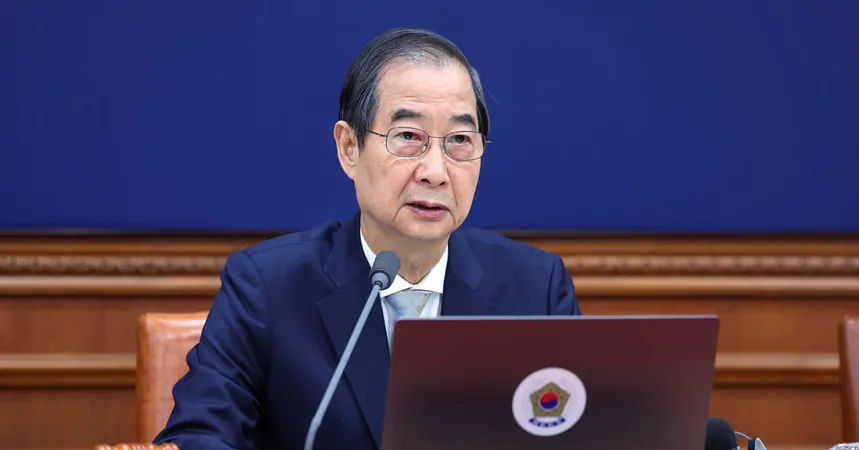
South Korea Plunges into Political Turmoil as Acting President Faces Impeachment
2024-12-27
Author: Wai
Overview of the Situation
In a dramatic escalation of South Korea's political crisis, opposition lawmakers are gearing up to vote on Friday regarding the impeachment of the prime minister and acting president, Han Duck-soo. This development marks a distressing chapter in a saga that has left the nation in a precarious power vacuum.
Background of Impeachment
Just weeks ago, Mr. Han was thrust into the role of acting president following the impeachment and suspension of President Yoon Suk Yeol on December 14, an unprecedented move that placed the country under military rule for the first time in 45 years. The nation's political landscape has since become increasingly unstable, as Mr. Han now faces an impeachment motion from the main opposition party after his refusal to appoint three judges to vacancies in the Constitutional Court. The court is set to decide whether to reinstate Mr. Yoon or uphold the decision that ousted him.
Economic Impact
This political uncertainty is taking a severe toll on South Korea's economy, as both business and consumer confidence plummet. The South Korean won has seen a drastic decline, pushing it to its weakest levels against the U.S. dollar since the global financial crisis.
Opposition Demands
The opposition has aggressively pursued Mr. Han to approve nominees for the Constitutional Court, emphasizing the importance of having a full bench to adjudicate Mr. Yoon's impeachment effectively. However, Mr. Yoon's governing party contends that only a legitimately elected president possesses the authority to make such judicial appointments.
Constitutional Court's Role
At the core of this crisis is the potential ruling of the Constitutional Court regarding Mr. Yoon's future. To remove him from office, at least six out of the court's nine justices must vote in favor of impeachment. Currently, the court has only six justices due to recent retirements, creating a precarious situation where a single dissenting vote could lead to the reinstatement of Mr. Yoon, whose impeachment trial is set to commence today.
Mr. Han's Stance
In a televised address, Mr. Han stated he would postpone his appointments until the competing political factions, including Mr. Yoon's People Power Party and the Democratic Party, reach a consensus about his authority as acting president. Citing the need to exercise restraint, Mr. Han argued that an acting president should avoid wielding the significant powers designated to a fully elected president.
Accusations Against Mr. Han
The tensions have escalated further following accusations from the opposition, which allege that Mr. Han supported Mr. Yoon during his controversial military rule declaration on December 3. Lawmakers charged Mr. Yoon with insurrection due to deploying troops to the National Assembly to block a vote against his martial law and suppress opposition.
Disagreement on Impeachment Votes
The two camps disagree on the number of votes required for Mr. Han's impeachment. The ruling party claims a two-thirds majority is necessary, while the opposition argues that a simple majority suffices for a prime minister. The outcome of the vote hinges on the decision of the National Assembly's speaker, Woo Won-shik, a member of the Democratic Party.
Economic Indicators
Amid these political upheavals, economic indicators are continuing to reflect the nation's instability. Recent data revealed that the won fell sharply on Thursday, mirroring levels last seen during the financial crisis of 2008, while the KOSPI stock index suffered a 1.5 percent drop, compounding a substantial decline of roughly 10 percent year-to-date.
Conclusion
As South Korea teeters on the brink of further political turmoil, the stakes reach beyond the competing politicians, directly impacting the livelihoods of millions. Will Mr. Han Duck-soo survive the impeachment vote, or will South Korea plunge deeper into chaos? The world watches closely as this volatile situation unfolds.


 Brasil (PT)
Brasil (PT)
 Canada (EN)
Canada (EN)
 Chile (ES)
Chile (ES)
 España (ES)
España (ES)
 France (FR)
France (FR)
 Hong Kong (EN)
Hong Kong (EN)
 Italia (IT)
Italia (IT)
 日本 (JA)
日本 (JA)
 Magyarország (HU)
Magyarország (HU)
 Norge (NO)
Norge (NO)
 Polska (PL)
Polska (PL)
 Schweiz (DE)
Schweiz (DE)
 Singapore (EN)
Singapore (EN)
 Sverige (SV)
Sverige (SV)
 Suomi (FI)
Suomi (FI)
 Türkiye (TR)
Türkiye (TR)